The AMD 3rd Gen Ryzen Deep Dive Review: 3700X and 3900X Raising The Bar
by Andrei Frumusanu & Gavin Bonshor on July 7, 2019 9:00 AM EST** = Old results marked were performed with the original BIOS & boost behaviour as published on 7/7.
Gaming: Ashes Classic (DX12)
Seen as the holy child of DirectX12, Ashes of the Singularity (AoTS, or just Ashes) has been the first title to actively go explore as many of the DirectX12 features as it possibly can. Stardock, the developer behind the Nitrous engine which powers the game, has ensured that the real-time strategy title takes advantage of multiple cores and multiple graphics cards, in as many configurations as possible.
As a real-time strategy title, Ashes is all about responsiveness during both wide open shots but also concentrated battles. With DirectX12 at the helm, the ability to implement more draw calls per second allows the engine to work with substantial unit depth and effects that other RTS titles had to rely on combined draw calls to achieve, making some combined unit structures ultimately very rigid.
Stardock clearly understand the importance of an in-game benchmark, ensuring that such a tool was available and capable from day one, especially with all the additional DX12 features used and being able to characterize how they affected the title for the developer was important. The in-game benchmark performs a four minute fixed seed battle environment with a variety of shots, and outputs a vast amount of data to analyze.
For our benchmark, we run Ashes Classic: an older version of the game before the Escalation update. The reason for this is that this is easier to automate, without a splash screen, but still has a strong visual fidelity to test.
| AnandTech CPU Gaming 2019 Game List | ||||||||
| Game | Genre | Release Date | API | IGP | Low | Med | High | |
| Ashes: Classic | RTS | Mar 2016 |
DX12 | 720p Standard |
1080p Standard |
1440p Standard |
4K Standard |
|
Ashes has dropdown options for MSAA, Light Quality, Object Quality, Shading Samples, Shadow Quality, Textures, and separate options for the terrain. There are several presents, from Very Low to Extreme: we run our benchmarks at the above settings, and take the frame-time output for our average and percentile numbers.
All of our benchmark results can also be found in our benchmark engine, Bench.
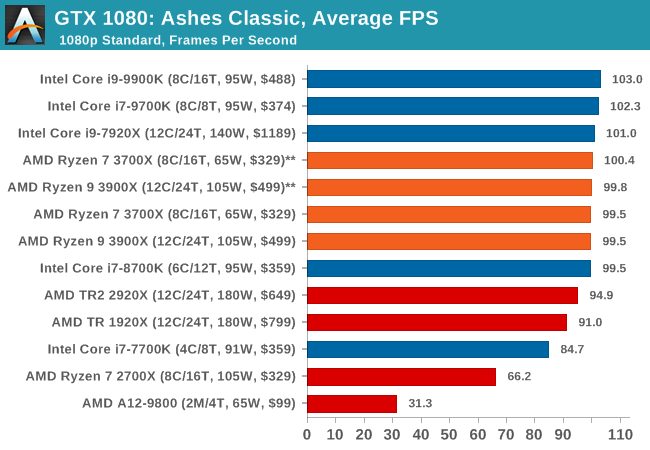
| Ashes Classic | IGP | Low | Medium | High |
| Average FPS | 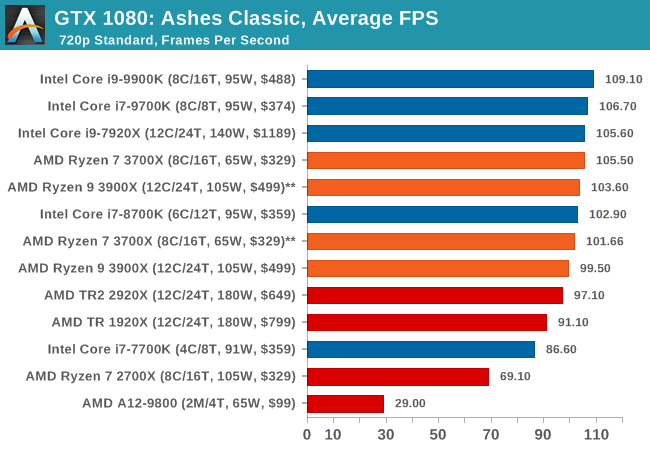 |
 |
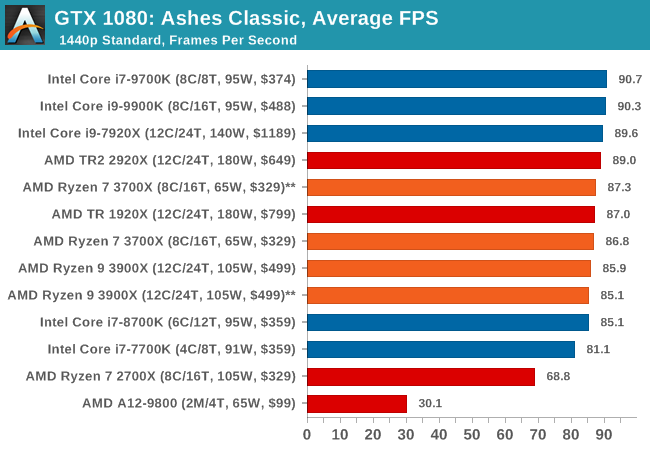 |
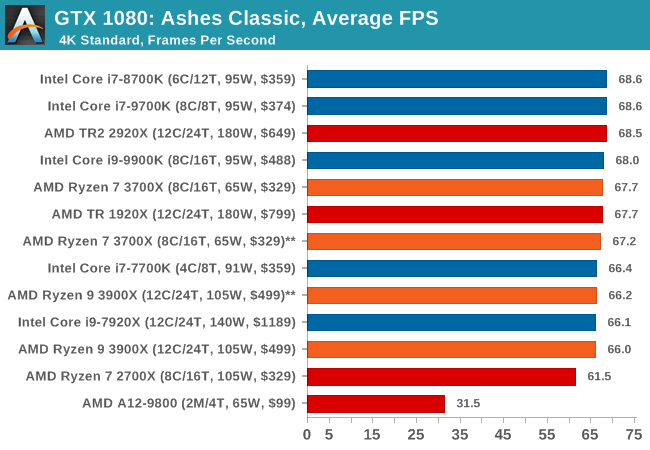 |
| 95th Percentile | 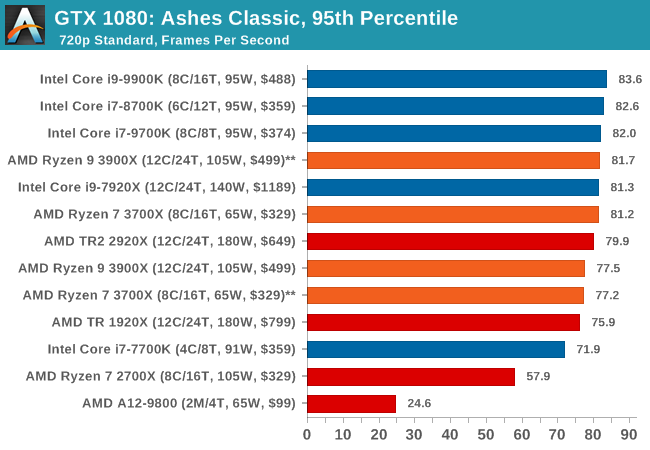 |
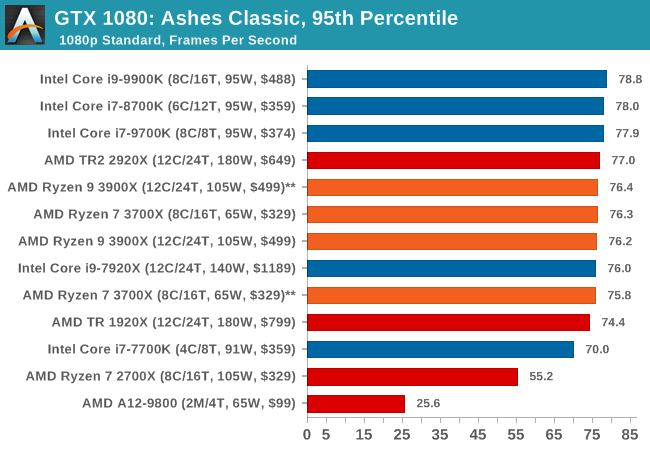 |
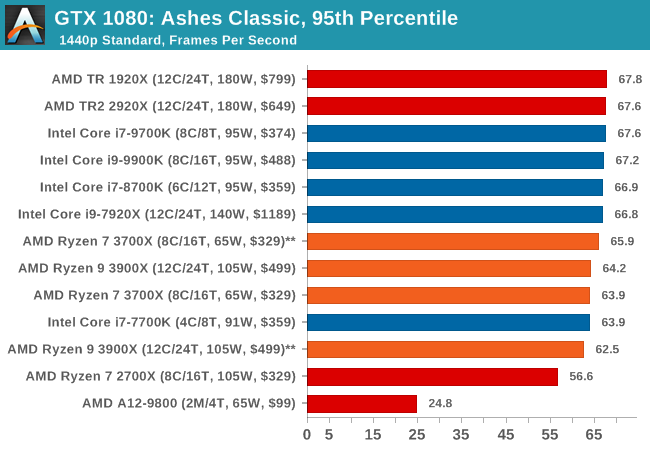 |
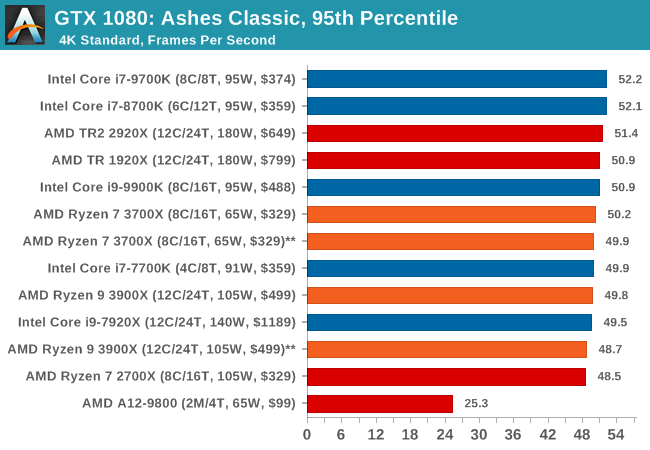 |


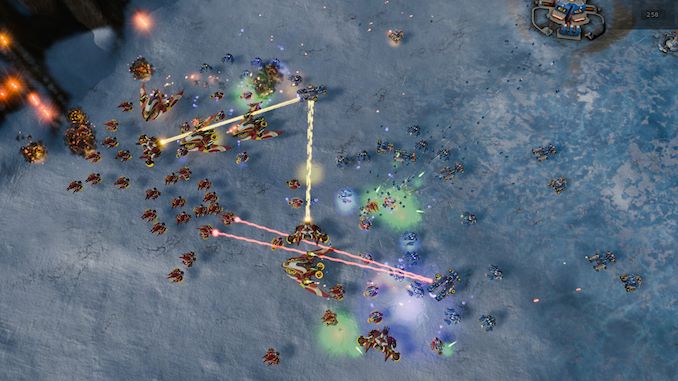








447 Comments
View All Comments
Andrei Frumusanu - Sunday, July 7, 2019 - link
CPUs are designed with memory latencies in mind when clocking at a certain clock - the current comparison at slightly different clocks is still perfectly valid for IPC.RSAUser - Monday, July 8, 2019 - link
Then show a power difference since the 9900K is double the draw...Mugur - Monday, July 8, 2019 - link
Done by other sites / youtube channels (at 4 Ghz). Ryzen 3000 is destroying Intel at the same clock.isthisavailable - Sunday, July 7, 2019 - link
With improved 7nm+ process for next gen, AMD can hit 5ghz and take the single core crown.Maxiking - Sunday, July 7, 2019 - link
Just like they did with the 14nm+ aka 12nm.Just like they were supposed to do with this gen.
But, but, but..?
sor - Sunday, July 7, 2019 - link
Actually that’s a bad example because we did see 200-300mhz bumps each generation between Ryzen 1000 and 3000. At that pace it’s possible to see a 5ghz turbo next generation, or be close enough.If you’re saying that everyone expected 5ghz with Ryzen 2000, then yes, if that’s true then those people were being unreasonable. At this point though it’s not a big leap.
Maxiking - Sunday, July 7, 2019 - link
It is a perfectly valid example, the bump between 1st gen and 2ng gen ryzen was 200mhz. Max OC on 1st gen was 4.1ghz, the max on the 2nd gen was 4.3ghz.There is no bump this year. I am highly skeptical they would be able to reach 4.6ghz on all cores with 7 nm+ next year. TSMC nodes are nothing special, you hit the wall and you are done regardless of voltage used.
sor - Sunday, July 7, 2019 - link
last year we had 3.7/4.3ghz as the flagship Ryzen 7 desktop. This year we get 3.9/4.5ghz in Ryzen 7 and up to 4.7ghz single threaded in Ryzen 9.These parts are well beyond anything we saw in the 2000 series, to claim there has been no frequency improvement is disingenuous at best. Going to 5ghz is just a small process tweak away this time.
Maxiking - Sunday, July 7, 2019 - link
Yeah and we were promised 3900x boosting up to 4.6ghz and it barely boost to 4.2ghz and can be manually overclocked to 4.3ghz.I will believe when I see it.
So no, there is no frequency boost with these chips.
Mugur - Monday, July 8, 2019 - link
You are wrong, 3900 is boosting to 4.55-4.6 single core all day.